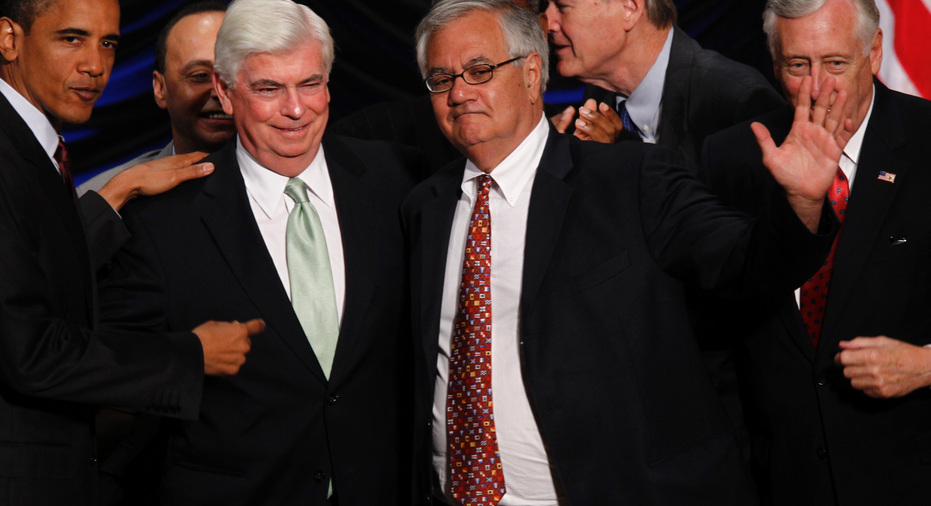AP Explains: Congress moves to roll back Dodd-Frank law

WASHINGTON – Just over decade ago, the first inklings of the coming recession emerged as a housing bubble fueled by scant regulation, low-interest rates and easy credit gradually began to crater and soon would take the rest of the economy along for the painful ride.
By the time the Great Recession ended in June 2009, almost no one was spared.
Home prices fell 30 percent on average, the unemployment rate nearly doubled and the S&P 500 lost about half its value. The net worth of U.S. households and nonprofit organizations fell by nearly $14 trillion, about 20 percent.
In the midst of a presidential election, Washington struggled in its response. The bankruptcy of Lehman Brothers and the takeover of Merrill Lynch turned the spotlight on Democratic Sen. Barack Obama of Illinois and Republican Sen. John McCain even brighter, with McCain's assertion that the "the fundamentals of our economy are strong" used to depict him as out of touch.
After the economy stabilized, Congress shifted from economic stimulus and bailouts to establishing the kind of regulatory framework that might keep another Great Recession from happening. The result was the Dodd-Frank Wall Street Reform and Consumer Protection Act of 2010.
On Tuesday, Congress voted to roll back some key elements of the law. A look at the background of the legislation and what's being changed.
___
REPUBLICANS DON'T LIKE DODD-FRANK
In June 2010, the House passed the financial regulatory overhaul by a vote of 237-192. Only three Republicans sided with the vast majority of Democratic members in support of the bill.
Two weeks later, the Senate passed the bill 60-39. This time, only two Republicans voted for the bill, Sens. Olympia Snowe of Maine and Scott Brown of Massachusetts. But that was just enough to overcome the procedural hurdles that can bring major legislation to a crashing halt in the Senate.
Obama signed Dodd-Frank into law on July 21, 2010: "In the end, our financial system only works — our market is only free — when there are clear rules and basic safeguards that prevent abuse, that check excess, that ensure that it is more profitable to play by the rules than to game the system," Obama said. "And that's what these reforms are designed to achieve — no more, no less."
___
WHAT DOES DODD-FRANK DO?
Under the act, large banks undergo "stress tests" to ensure they have enough capital necessary to absorb losses during an economic crisis. The law also put into place strict limits on how commercial banks could invest capital in speculative investments.
Dodd-Frank also established a process when the federal government could break-up and wind down a failing financial company whose failure threatens financial stability in the United States. And it established a new agency with a mission of ensuring that banks and other financial companies don't abuse consumers.
That's just a small snapshot of the changes put into place through the nearly 2,300-page bill.
___
WHO IS DODD AND WHO IS FRANK?
Rep. Barney Frank was the top Democrat on the House Financial Services Committee. When the financial crisis hit, the Massachusetts lawmaker worked closely with the Bush administration to enact a historic bailout of the nation's financial system so that the government could purchase as much as $700 billion in troubled assets to stabilize banks and get them lending again. Once the crisis began to subside, he turned his attention to an overhaul of the entire financial services industry. Frank was renowned for his knowledge of public policy and parliamentary rules, but also for his gruff, piercing criticism for those who disagreed with him. He declined to seek re-election in 2012 after serving 16 terms.
Sen. Christopher Dodd was the chairman of the Senate's Banking committee. Dodd announced in January 2010 that he would not seek re-election once his term ended, and he led the debate on the Senate side without fear of how it would harm his political standing. His home state of Connecticut counts several of the insurance companies that were shaken in the crisis.
___
WHAT IS CHANGING?
The Republican-led legislation, pushed by Wall Street banks as well as regional banks and smaller institutions, raises the threshold at which banks are deemed so large that a failure would cause major damage to the wider economy. The bill makes a fivefold increase, to $250 billion, in the threshold of assets at which banks are deemed to pose a potential threat if they fail.
Backers of the legislation say it will spur the economy by increasing lending, easing the regulatory burden on small and medium-sized banks. Critics argue that it increases the chances of future taxpayer bailouts like the ones that followed the financial crisis.
___
WILL THE PRESIDENT SIGN THE BILL?
That's expected. The bill, which garnered some Democratic support in the House and Senate, is seen as a legislative victory for Trump. During his campaign, he repeatedly attacked the Dodd-Frank Act as a "disaster" that had crimped lending and stifled the economy's ability to grow by imposing burdensome regulations.
___
Associated Press writer Marcy Gordon contributed to this report.



















